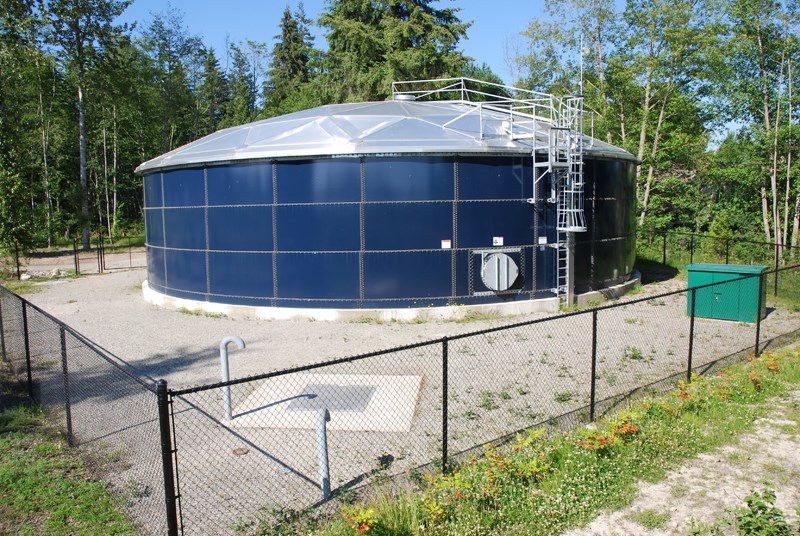The boil water advisory for about 75 per cent of Gibsons was lifted on Monday, June 16, after the entire town was placed on the Sunshine Coast Regional District (SCRD) water supply under stage 3 water use restrictions.
All properties within Gibsons will remain on SCRD water “until the Town’s own water source can once again be used,” Mayor Wayne Rowe said in a statement emailed Monday morning to media.
Under the direction of the Vancouver Coastal Health (VCH) drinking water officer, the Town has hired a consultant to carry out a professional assessment of the Parkland reservoir, where the E.coli contamination was first detected on June 4, and is developing a plan for the emergency chlorination of the municipal water supply, director of engineering Dave Newman told council Tuesday night.
In the short term, he said, the Town is investigating whether both zones one and two can go back on Gibsons water after emergency chlorination is installed at the municipal wells and the Parkland reservoir assessment is complete.
“Is it possible to ever have our unchlorinated water back, or are we stuck with chlorination?” Coun. Lee Ann Johnson asked at the meeting.
“The word from the drinking water officer at this point is that until we find the source of contamination we must retain residual chlorine in our system,” Newman said. “So we can cross our fingers with the investigation.”
The SCRD introduces chlorine into its water system, which is tested to ensure a residual amount is present “to attack any bug that might be in there,” Newman explained.
The boil water advisory was issued on June 6 after a second sample taken from the Parkland reservoir tested positive for E.coli.
Samples taken between June 8 and June 13 found no contamination, prompting VCH to authorize the Town to discontinue daily bacterial sampling, Newman said.
He said the assessment of the Parkland reservoir would see it “fully drained, examined, disinfected and any possible weaknesses in the security of the reservoir identified.”
Chief administrative officer Mani Machado said Monday he expected the Town could be on the SCRD water supply for two to three weeks.
Council agreed Tuesday to cancel three water-related projects worth $57,000 to help cover the unexpected costs of dealing with the emergency, including $14,000 budgeted under aquifer protection and communications to create a permanent “Walk on Water” tour.
Five projects worth a total of $325,400 were left in the work plan, but Rowe did not rule out further project cuts to pay for the emergency, since the water fund is “seriously depleted” and “we don’t know where that money is going to come from.”
While stage 3 watering restrictions were in effect for the whole town due to the extra demand on the SCRD system, Machado said businesses have not been asked to cut back on water use.
“We’ve just contacted [businesses] — we’ve got staff out there now — to tell them about the notice being lifted, especially food service places, but we haven’t given them any directions on water restrictions,” he said Monday. “We’re hoping it will be short term.”
Stage 3 prohibits lawn sprinkling, washing vehicles, hosing windows or exterior building surfaces, and filling swimming pools, ornamental ponds or fountains.
Hand-held watering is allowed for trees, shrubs, flowers and vegetables.
Meanwhile, a Gibsons man took issue last week with health officials’ claims that no confirmed cases of gastrointestinal illness caused by the contamination had been reported.
Dougall Road resident Richard Morgan said his wife came down with severe dehydration, vomiting and diarrhea on June 2 — two days before the first municipal water sample tested positive for E.coli and four days before the boil water notice came into effect. She was taken by ambulance to St. Mary’s Hospital, where she stayed overnight for treatment.
The next day, Morgan said, he became ill, suffering from severe diarrhea and vomiting.
Morgan also questioned why officials waited until there was a second confirmed positive sample on June 6 to issue the boil water advisory.
“That’s two to three days when restaurants were still washing all their products in contaminated water,” he said.
Dr. Paul Martiquet, VCH’s medical health officer for the Sunshine Coast, said many people are linking symptoms of gastrointestinal illness to drinking water, even if they don’t live in Gibsons.
“I had people call from Pender Harbour who think the water somehow made its way up there,” Martiquet said.
He said a number of viruses and bacteria are present at this time of year that are not linked to the water supply, adding that family doctors should be testing patients’ stool for E.coli bacteria if they do exhibit symptoms.
Waiting two days after the initial positive sample to declare the boil water advisory was “entirely acceptable,” he said. “We were dealing with a water supply which up to that time had not had any concerns about contamination.”
An index finger touching the sample, he said, would be enough to contaminate it. “We wanted to make sure it wasn’t a false positive or a contaminated sample.”



